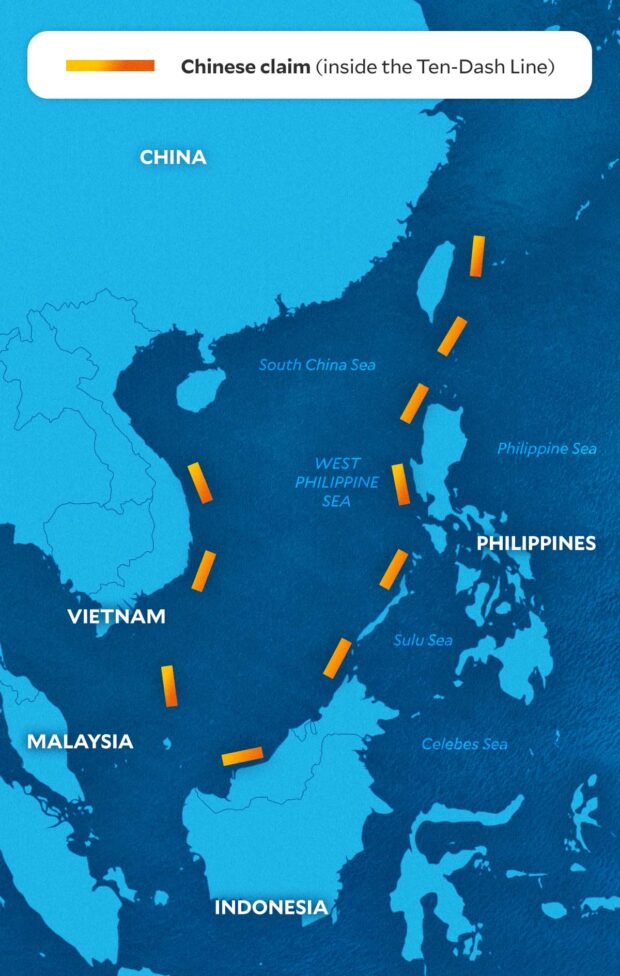
An illustration of the 10-dash line map, which China released in August. GRAPHIC BY ED LUSTAN
BERLIN – President Ferdinand “Bongbong” R. Marcos Jr. on Tuesday questioned the premise of China’s proposals on the South China Sea dispute, particularly its 10-dash line in asserting control over the disputed waters.
In a joint press conference with German Chancellor Olaf Scholz here, Marcos stressed that China’s 10-dash line claim is not recognized by any country.
The President said the Philippines did not reject any proposition by China but questioned its premise in the territorial dispute.
“We have not rejected any proposals that China has made for us. But the premise is something that we question. The premise that China has made is that its territory follows the 10-dash line. This is not recognized by any country, by any international body, and certainly not the Philippines,” he said.
He pointed out that the Philippines’ baselines were already well established and that China intruded on the Philippines’ economic zone.
“Until that premise that China has made in terms of all these discussions with the Philippines, it is very difficult to see a way forward,” Marcos said.
He added that as the President, he has no choice but to fulfill his duty to defend the country’s territorial area over land and sea and that he will continue to do so.
The President stressed that it is in the interest of all nations to ensure freedom of navigation and overflight in the South China Sea, which handles 60 percent of the world’s trade.
“It’s not solely the interest of the Philippines or the Association of Southeast Asian Nations, or the Indo-Pacific region but the entire world. It is all our interest to keep it a safe passage for all international commerce that goes on in the South China Sea,” he added.
Scholz agreed with Marcos and reiterated his support for the Philippines “in ensuring that rights are being protected.”
“Respect for international law is of greatest importance to us and this is equally true for the international law that governs international navigation. We have the United Nations Convention on the Law of the Sea, we have the arbitral tribunal. I believe it to be very important to adhere to the legislation in place,” he said.
Marcos made the remarks after the Department of Foreign Affairs said it received several maritime-related proposals from China last year.
However, these could not be considered as these are against the Philippines’ interests.
Among the proposals were a push for “actions that would be deemed as acquiescence or recognition of China’s control and administration over the Ayungin Shoal.”
The DFA said the Philippines cannot consider such a proposal without violating the 1987 Constitution or international law.
“While a few proposals were deemed somewhat workable, many of the remaining Chinese proposals were determined, after careful study, scrutiny and deliberation within the Philippine government, to be contrary to our national interests,” it said in a statement on Tuesday.
It added that any agreement with a foreign government should be in accordance with mutual interests and should not undermine the Constitution or diminish the Philippines’ rights under international law.
In 2016, the Permanent Court of Arbitration ruled that China has no basis to claim the entire South China Sea and rejected its nine-dash line claim.


